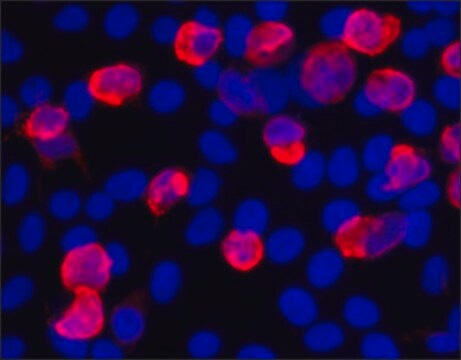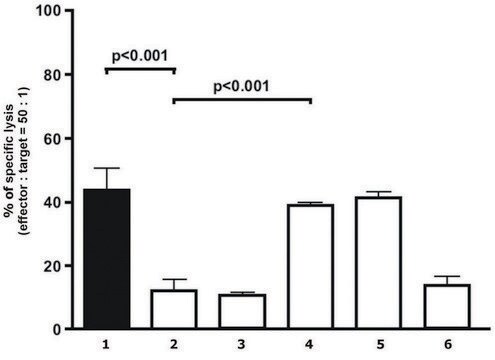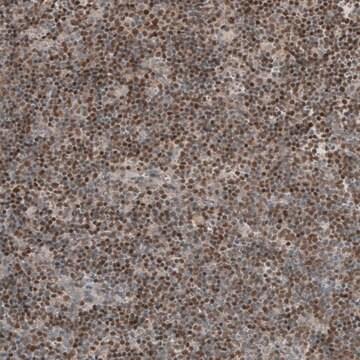SAB4700308
Monoclonal Anti-HLA-G antibody produced in mouse
clone G233, purified immunoglobulin, buffered aqueous solution
Iniciar sesiónpara Ver la Fijación de precios por contrato y de la organización
About This Item
Código UNSPSC:
12352203
NACRES:
NA.41
Productos recomendados
origen biológico
mouse
conjugado
unconjugated
forma del anticuerpo
purified immunoglobulin
tipo de anticuerpo
primary antibodies
clon
G233, monoclonal
Formulario
buffered aqueous solution
reactividad de especies
human
concentración
1 mg/mL
técnicas
flow cytometry: suitable
isotipo
IgG2a
Nº de acceso NCBI
Nº de acceso UniProt
Condiciones de envío
wet ice
temp. de almacenamiento
2-8°C
modificación del objetivo postraduccional
unmodified
Información sobre el gen
human ... HLA-G(3135)
Categorías relacionadas
Descripción general
The antibody G233 recognizes several isoforms of HLA-G expressed in all populations of extravillous trophoblast (cell columns, interstitial trophoblast, endovascular trophoblast, placental bed giant cells). HLA-G belongs to the nonclassical MHC Class I molecules (MHC Class Ib). The antibody G233 has been found not to cross-react with any other MHC Class I antigens (HLA-A, -B, -C, -E, -F).
Inmunógeno
HLA-A21/human beta2-microglobulin double transgenic mice were immunized with murine L cells transfected with both human beta2-microglobulin and HLA-G
Aplicación
The reagent is designed for Flow Cytometry analysis. Suggested working dilution for Flow Cytometry is 5-10 μg/mL of sample. Indicated dilution is recommended starting point for use of this product. Working concentrations should be determined by the investigator.
Características y beneficios
Evaluate our antibodies with complete peace of mind. If the antibody does not perform in your application, we will issue a full credit or replacement antibody. Learn more.
Forma física
Solution in phosphate buffered saline, pH 7.4, with 15 mM sodium azide.
Cláusula de descargo de responsabilidad
Unless otherwise stated in our catalog or other company documentation accompanying the product(s), our products are intended for research use only and are not to be used for any other purpose, which includes but is not limited to, unauthorized commercial uses, in vitro diagnostic uses, ex vivo or in vivo therapeutic uses or any type of consumption or application to humans or animals.
¿No encuentra el producto adecuado?
Pruebe nuestro Herramienta de selección de productos.
Código de clase de almacenamiento
10 - Combustible liquids
Punto de inflamabilidad (°F)
Not applicable
Punto de inflamabilidad (°C)
Not applicable
Elija entre una de las versiones más recientes:
¿Ya tiene este producto?
Encuentre la documentación para los productos que ha comprado recientemente en la Biblioteca de documentos.
M J C Van Lierop et al.
Molecular human reproduction, 8(8), 776-784 (2002-08-01)
Human leukocyte antigen (HLA)-G, which is mainly expressed at the maternal-fetal interface, may play a role in the immune tolerance of the semi-allogenic fetus by the mother. Functional studies have shown that HLA-G is indeed a potential modulator of different
Jay M Bolnick et al.
Fertility and sterility, 102(1), 135-142 (2014-05-16)
To use trophoblast cells accumulating in the endocervical canal at the beginning of pregnancy for noninvasive prenatal testing. Prospective, double-blinded test for fetal gender. Academic medical center. Fifty-six women with singleton pregnancies at gestational age 5-20 weeks. Isolation of fetal
Nele Gao et al.
Arthritis & rheumatology (Hoboken, N.J.), 66(10), 2849-2861 (2014-06-20)
B cells with immunoregulatory properties (Breg cells) have been described in mice, but their role in the control of human immune responses is not well defined. We recently identified a human population of activated FSC(high) B cells that exhibited regulatory
Natasja Nielsen et al.
Immunology, 142(4), 581-593 (2014-03-29)
Rheumatoid arthritis (RA) is an autoimmune disease characterized by chronic inflammation and synovial hyperplasia leading to progressive joint destruction. Fibroblast-like synoviocytes (FLS) are central components of the aggressive, tumour-like synovial structure termed pannus, which invades the joint space and cartilage.
Nuestro equipo de científicos tiene experiencia en todas las áreas de investigación: Ciencias de la vida, Ciencia de los materiales, Síntesis química, Cromatografía, Analítica y muchas otras.
Póngase en contacto con el Servicio técnico








